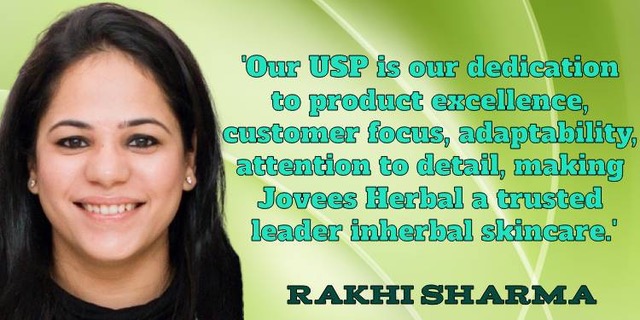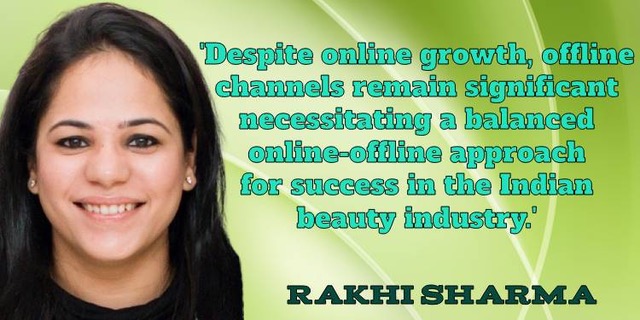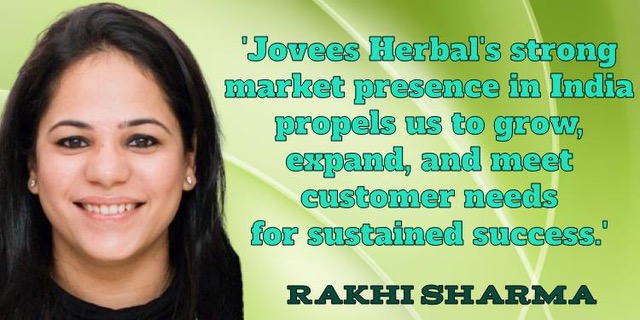Jovees Herbal, a herbal skincare and haircare brand with a diverse range of over 150 products.
They’re currently expanding their skincare range and have a strong presence in India, Sri Lanka, France, Sudan, Qatar, and Malaysia.
Medianews4u.com caught up with Rakhi Sharma, the Vice President of Marketing and E-commerce at Jovees. With a background working with companies like American Express, Reliance, and Percept, She now leads marketing at Jovees.
Notably, Rakhi’s tenure at Jovees Herbal saw 5X growth in E-commerce sales under her leadership. Alongside this achievement, she spearheaded campaigns that elevated the brand’s visibility and engagement in the digital space.
What is Jovees’ USP in a competitive category?
Jovees Herbal stands out in the competitive skincare landscape with a distinct commitment to excellence and customer satisfaction. Our core belief is in delivering the finest products that yield exceptional results, ensuring utmost satisfaction for our customers.
We pride ourselves on staying aligned with market trends while staying true to our core values, which has kept us significant even after two decades in the industry. Our management is deeply involved in every aspect of our operations, particularly in research and development and product quality assurance. This hands-on approach ensures that our products meet the highest standards of quality and efficacy.
Overall, our unique selling proposition (USP) lies in our unwavering dedication to product excellence, customer-centric approach, adaptability to market dynamics, and meticulous attention to detail in product development and quality assurance. These qualities distinguish Jovees Herbal as a trusted leader in the herbal skincare sector.
Are online and offline platforms both equally important?
In the beauty and skincare industry in India, both online and offline platforms play crucial roles, each catering to different consumer preferences and needs. Here’s a breakdown:
- Online Platforms
- Convenience: Online platforms offer the convenience of shopping from anywhere, at any time, which resonates well with busy urban lifestyles.
- Wide Range: Consumers have access to a vast array of products from various brands, often at competitive prices.
- Information: Online platforms provide detailed product descriptions, reviews, and recommendations, empowering consumers to make informed choices.
- Accessibility: They allow access to international brands and niche products that might not be readily available in local offline stores.
- Offline Platforms
- Personal Experience: Offline stores provide a tactile and sensory experience, allowing consumers to touch, feel, and test products before purchase.
- Instant Gratification: Immediate availability of products satisfies the need for instant gratification, which is particularly appealing for impulse purchases.
- Expert Guidance: In-store beauty advisors or consultants offer personalized recommendations and skincare consultations, enhancing the shopping experience.
- Trust: Some consumers prefer to buy from trusted brick-and-mortar stores, especially for skincare products, where they can verify authenticity and quality.
While online platforms have seen significant growth, especially with the rise of e-commerce, offline platforms still hold significance, particularly in India where personal interactions and tactile experiences are valued. Therefore, a balanced approach that integrates both online and offline channels is often necessary for success in the beauty and skincare industry in India.

How important is an omnichannel approach?
In the beauty and skincare industry in India, an omnichannel approach is increasingly important due to shifting consumer behaviour and expectations. Here’s why:
Consumer Preferences: Indian consumers are diverse, with varying preferences for shopping online or offline. An omnichannel strategy ensures that brands can cater to the preferences of different consumer segments, whether they prefer the convenience of online shopping or the personalized experience of shopping in-store.
Seamless Experience: An omnichannel approach aims to provide a seamless shopping experience across all touchpoints, including online platforms, mobile apps, social media, physical stores, and customer service channels. This coherence ensures consistency in branding, messaging, and service quality, regardless of the channel through which consumers interact with the brand.
Increased Reach: By leveraging multiple channels, brands can expand their reach to a wider audience. In India, where internet penetration is growing rapidly, particularly in rural areas, an omnichannel strategy allows brands to tap into both urban and rural markets effectively.
Data-driven Insights: Omnichannel strategies enable brands to gather data from various touchpoints, providing valuable insights into consumer behavior, preferences, and purchasing patterns. This data can inform targeted marketing efforts, product development, and inventory management, leading to more efficient operations and improved customer satisfaction.
Competitive Advantage: Brands that adopt an omnichannel approach often gain a competitive edge in the market. By offering a seamless, integrated experience across channels, they can differentiate themselves from competitors and build stronger connections with consumers.
Adaptability: In a rapidly evolving market landscape, an omnichannel approach allows brands to adapt to changing trends and technologies. Whether it’s embracing new e-commerce platforms, incorporating AR/VR technology for virtual try-ons, or optimizing the mobile shopping experience, an omnichannel strategy enables brands to stay agile and responsive to consumer needs.
In conclusion, an omnichannel approach is crucial for success in the beauty and skincare industry in India. By catering to diverse consumer preferences, providing a seamless shopping experience, leveraging data-driven insights, and staying adaptable to change, brands can effectively engage with consumers and drive growth in this dynamic market.
What are going to be the focus areas when it comes to marketing?
When it comes to marketing, the focal points will include creating genuine content, refining user interface and experience (UI/UX), and ensuring visibility in locations where consumer intent is strong, increasing the likelihood of consideration and conversion. These strategies emphasize the delivery of authentic and valuable content, enhancing the overall user experience across digital platforms, and strategically placing the brand in channels frequented by consumers with high purchase intent. By prioritizing these key areas, marketers can successfully capture audience interest, engage them effectively, and drive conversions aligned with business goals.
What are the key channels that will be used for marketing? TV, print, radio, digital, BTL etc.
This year, our primary emphasis will be on harnessing digital platforms, prioritizing excellence in content creation, and delivering informative material. Active listening and engagement are pivotal for any brand, and Jovees Herbal is committed to embracing these principles to amplify its presence.

What role is Parineeti Chopra playing as your brand ambassador?
Much like how a well-known personality such as Parineeti Chopra’s collaboration with the brand has significantly expanded its outreach, this year, Jovees Herbal is strategically focusing on leveraging digital mediums to achieve a similar level of engagement and visibility. By prioritizing the creation of high-quality, informative content and actively listening and engaging with its audience, Jovees Herbal aims to emulate the success it has experienced through Parineeti’s association, ultimately enhancing its brand presence and impact.
What trends are we seeing in terms of consumers preferences and purchase habits for beauty products?
Certainly! Let’s incorporate some data to support the trends mentioned:
Natural and Herbal Ingredients: The global natural and organic skincare market is estimated to grow at a CAGR of around 8% from 2021 to 2026, reaching approximately $25 billion by 2026. In India, the market for Ayurvedic skincare products is projected to expand at a CAGR of over 10% during the forecast period, driven by increasing consumer awareness and preference for traditional ingredients.
Clean Beauty Movement: Research indicates that over 50% of consumers globally actively seek out skincare products labeled as “clean” or free from harmful chemicals. In India, a survey found that 72% of consumers are willing to pay a premium for clean beauty products, reflecting a strong demand for safer and more sustainable skincare options.
Sustainability and Eco-Friendly Practices: According to a report by Grand View Research, the global market for sustainable cosmetics is expected to grow at a CAGR of over 5% from 2021 to 2028. In India, the market for eco-friendly skincare products is witnessing robust growth, with a significant portion of consumers prioritizing brands that demonstrate environmental responsibility.
Personalization and Customization: Studies show that over 40% of consumers globally are interested in personalized skincare products tailored to their specific needs and preferences. In India, the personalized skincare market is projected to reach a value of over $300 million by 2025, driven by increasing demand for customized beauty solutions.
Digital Transformation: The influence of digital platforms on skincare trends is substantial, with social media platforms like Instagram and YouTube serving as key channels for beauty-related content. Over 70% of consumers globally report using social media for skincare advice and product recommendations. In India, digital platforms play a crucial role in shaping consumer perceptions and driving skincare purchases, particularly among the younger demographic.
Rise of Indie Brands: Indie skincare brands represent a growing segment of the market, capturing the attention of consumers seeking unique and authentic beauty products. In the United States, indie beauty brands accounted for over 25% of skincare sales in 2021, with a similar trend observed in India as homegrown brands gain traction among consumers.
Men’s Skincare Market: The global men’s skincare market is expected to surpass $20 billion by 2027, fueled by changing grooming attitudes and an increasing number of men adopting skincare routines. In India, the men’s grooming market is projected to grow at a CAGR of over 15% from 2021 to 2026, driven by rising disposable incomes and evolving lifestyle preferences among male consumers.
By incorporating these statistics, we can provide a more data-driven perspective on the skincare trends shaping consumer preferences and purchase habits globally and in India.

Where is the whitespace for you and the category in terms of market penetration?
As the Vice President of eCommerce and Marketing at Jovees Herbal, assessing our whitespace in terms of market penetration involves understanding our current market position and identifying opportunities for growth.
Jovees Herbal holds a strong position in the herbal skincare segment in India. We have built a loyal customer base over the years, known for our commitment to natural ingredients and effective skincare solutions. Our products are widely available through various retail channels, including brick-and-mortar stores and our own eCommerce platform.
While we have established ourselves as a reputable brand, there are still opportunities for further penetration and expansion within the skincare market. This includes:
Geographical Expansion: Exploring opportunities to expand our presence in Tier II and Tier III cities, where there is growing demand for herbal skincare products but limited availability of premium brands.
Product Diversification: Introducing new product lines or expanding existing ones to cater to evolving consumer preferences and emerging skincare trends. This could include innovative formulations, targeted towards specific skin concerns or demographics.We did several new launches last year they were all a huge success in terms of sales and product feedback and that’s for sure was a win.
Strengthening our digital presence and leveraging eCommerce channels to reach a wider audience. This involves optimizing our website, enhancing user experience, and implementing effective digital marketing strategies to drive online sales.
To capitalise on these whitespace opportunities, we will focus on Investing in marketing initiatives to raise brand awareness and promote our unique selling propositions, such as the use of natural ingredients and the efficacy of our products.
- Continuous innovation and product development to stay ahead of market trends and meet evolving consumer demands.
- Enhancing customer engagement and loyalty through personalized shopping experiences, customer feedback mechanisms, and rewards programs.
- Monitoring market dynamics and competition closely to identify emerging opportunities and threats, allowing us to adapt our strategies accordingly.
Overall, while Jovees Herbal has achieved a solid market presence in the herbal skincare segment in India, we recognize the importance of continuous growth and expansion to maintain our competitive edge and meet the needs of our discerning customers. By leveraging our strengths and exploring whitespace opportunities, we are poised for sustained success and market leadership in the skincare industry.

















